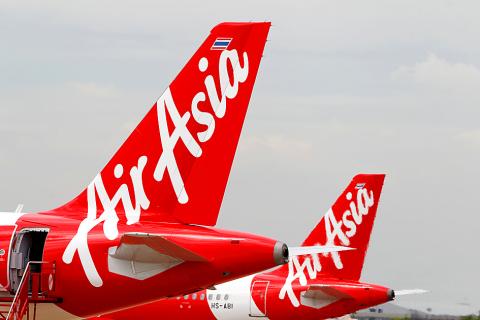Philippines AirAsia Inc, a low-cost carrier based in Manila, is scheduled to start regular flights to Taiwan next month.
Philippines AirAsia, an affiliate of AirAsia Bhd, a low-cost airline based in Malaysia, is planning to launch its services between Manila and Taipei on Nov. 1 with seven flights per week.
The Philippine carrier, which is a joint venture between three Philippine investors and AirAsia International Ltd, is also planning to provide three flights between Taipei and Cebu per week, starting on Nov. 4.

Photo: Reuters
Meanwhile, Hong Kong Express Airways Ltd, a low-fare airline based in Hong Kong, is planning to launch regular flight services between the territory and Hualien on Dec. 6, with three flights a week.
Hong Kong Express currently provides regular flights between Hong Kong and Taichung.
Nineteen budget carriers operate in the Taiwanese market after V Air (威航), a subsidiary of Taiwanese mid-sized international carrier TransAsia Airways (復興航空), ended its services on Oct. 1 as a result of massive losses.
In Taiwan, only one Taiwan-based budget airline — Tigerair Taiwan (台灣虎航), a joint venture between Tiger Airways Singapore Pty Ltd and Taiwan’s China Airlines (CAL, 中華航空) — remains operational, but it is struggling financially, while the other 18 competitors are based overseas.
CAL chairman Ho Nuan-hsuan (何煖軒) confirmed that the parent company has set up a task force to study the future of Tigerair Taiwan. The joint venture agreement between Tigerair Taiwan and Tiger Airways is scheduled to expire in April next year.
With the arrival of Philippines AirAsia, the number of low-cost carriers operating in Taiwan will rise to 20, indicating that the closure of V Air has not deterred foreign budget carriers from entering the market.
V Air launched its services in December 2014, three months after Tigerair Taiwan was launched. Both eyed the booming budget carrier market, but V Air posted accumulated losses of about NT$900 million (US$28.59 million) and Tigerair Taiwan incurred losses of about NT$1.1 billion in less than two years, with the losses more than half the two carriers’ paid-in capital.
The budget airline business in Taiwan has continued to grow since budget carriers first began operating locally in 2004.
Budget airlines last year transported 4.7 million passengers, almost 13.5 percent of the total number of passengers handled by carriers operating in Taiwan, up from about 3 percent in 2012.
However, the losses incurred by V Air and Tigerair Taiwan indicate that Taiwanese budget carriers are unable to compete with their foreign counterparts.
Yeh Wei-chien (葉文建), an associate professor at Kainan University’s Department of Air Transport, said that the operating costs of locally based budget carriers have been higher than those of their foreign counterparts due to their relatively smaller size.
Market sources have expressed concern about the future of Tigerair Taiwan, because if the only remaining Taiwanese budget carrier closes, the local low-cost airline market will be dominated by foreign players.

Taiwan’s long-term economic competitiveness will hinge not only on national champions like Taiwan Semiconductor Manufacturing Co. (TSMC, 台積電) but also on the widespread adoption of artificial intelligence (AI) and other emerging technologies, a US-based scholar has said. At a lecture in Taipei on Tuesday, Jeffrey Ding, assistant professor of political science at the George Washington University and author of "Technology and the Rise of Great Powers," argued that historical experience shows that general-purpose technologies (GPTs) — such as electricity, computers and now AI — shape long-term economic advantages through their diffusion across the broader economy. "What really matters is not who pioneers

In a high-security Shenzhen laboratory, Chinese scientists have built what Washington has spent years trying to prevent: a prototype of a machine capable of producing the cutting-edge semiconductor chips that power artificial intelligence (AI), smartphones and weapons central to Western military dominance, Reuters has learned. Completed early this year and undergoing testing, the prototype fills nearly an entire factory floor. It was built by a team of former engineers from Dutch semiconductor giant ASML who reverse-engineered the company’s extreme ultraviolet lithography (EUV) machines, according to two people with knowledge of the project. EUV machines sit at the heart of a technological Cold

TAIWAN VALUE CHAIN: Foxtron is to fully own Luxgen following the transaction and it plans to launch a new electric model, the Foxtron Bria, in Taiwan next year Yulon Motor Co (裕隆汽車) yesterday said that its board of directors approved the disposal of its electric vehicle (EV) unit, Luxgen Motor Co (納智捷汽車), to Foxtron Vehicle Technologies Co (鴻華先進) for NT$787.6 million (US$24.98 million). Foxtron, a half-half joint venture between Yulon affiliate Hua-Chuang Automobile Information Technical Center Co (華創車電) and Hon Hai Precision Industry Co (鴻海精密), expects to wrap up the deal in the first quarter of next year. Foxtron would fully own Luxgen following the transaction, including five car distributing companies, outlets and all employees. The deal is subject to the approval of the Fair Trade Commission, Foxtron said. “Foxtron will be

INFLATION CONSIDERATION: The BOJ governor said that it would ‘keep making appropriate decisions’ and would adjust depending on the economy and prices The Bank of Japan (BOJ) yesterday raised its benchmark interest rate to the highest in 30 years and said more increases are in the pipeline if conditions allow, in a sign of growing conviction that it can attain the stable inflation target it has pursued for more than a decade. Bank of Japan Governor Kazuo Ueda’s policy board increased the rate by 0.2 percentage points to 0.75 percent, in a unanimous decision, the bank said in a statement. The central bank cited the rising likelihood of its economic outlook being realized. The rate change was expected by all 50 economists surveyed by Bloomberg. The